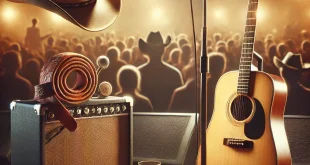The origin of country music is a story shaped by culture, hardship, and emotion. From Appalachian folk tunes to global popularity, country music has come a long way. But what is the history and origin of country music, and how did it all begin?
🏞️ Appalachian Roots and European Folk Traditions
Country music’s earliest origins trace back to the Appalachian Mountains in the late 19th century. Immigrants from Ireland, Scotland, and England brought with them traditional folk songs, fiddle tunes, and storytelling ballads. These songs were passed down orally and adapted to reflect life in the American countryside.
At the same time, the banjo, an instrument with African origins, entered the mix thanks to enslaved Africans in the American South. This blend of European melody and African rhythm became the foundation of early country music.
📻 The First Country Stars and the 1927 Bristol Sessions
In the 1920s, with the rise of radio and phonograph records, rural music reached national audiences. The pivotal moment came in 1927 during the Bristol Sessions — often called the “Big Bang of Country Music.” This recording session introduced the world to
-
The Carter Family, whose harmonies and home-centered lyrics captured hearts
-
Jimmie Rodgers, known for blending country with blues and his signature yodel
These artists defined early country music: raw, emotional, and deeply personal.
🎤 Country Music Evolves: 1930s–1950s
As the genre grew, so did its influences. Country music absorbed:
-
Blues from African-American musicians
-
Gospel from churches and Southern spirituals
-
Western swing from cowboy songs and big-band jazz
By the 1950s, Nashville had become the epicenter of country music. The Grand Ole Opry, a live radio broadcast, gave artists like Hank Williams national fame. Nashville also developed the famous “Nashville Sound”—a” smoother, more polished version of country featuring strings and background vocals.
🎸 Modern Country and Global Reach
In the late 20th century, country music kept evolving:
-
The outlaw movement of the 1970s (e.g., Willie Nelson, Waylon Jennings) rebelled against the polished Nashville sound.
-
In the 1990s, artists like Garth Brooks and Shania Twain brought country to stadiums and mainstream pop charts.
-
Today, country music includes a wide range of subgenres: country pop, Americana, bluegrass, and even country rap.
Its storytelling tradition remains, but production and style have become more diverse, reaching fans all over the world — from Europe to Asia.
🧭 Conclusion: What Is the History and Origin of Country Music?
What is the history and origin of country music?
It’s a story of migration, culture, and emotion. From Appalachian folk songs to global hits, country music has grown while staying true to its roots: real stories about real people. It’s a genre that continues to evolve — and its journey is far from over.
🎧 A Classic Country Hit: Kiss an Angel Good Mornin’
One of the most iconic tracks in country music history is “Kiss an Angel Good Mornin’”, performed by Charley Pride. Released in 1971, this timeless song combines heartfelt lyrics with a smooth, traditional country sound. Charley Pride, one of the few African-American artists to break into mainstream country, became a legend thanks to this hit, which topped the Billboard Hot Country Songs chart.
In the video below, you can enjoy this classic performance that perfectly captures the charm and simplicity of early 1970s country music. It’s a beautiful example of how the genre expressed love, joy, and everyday life — the very roots of country storytelling.
🎥 Watch the video:
(Incorpora qui il video di YouTube di “Kiss an Angel Good Mornin’”)


Comment Test
I care. So, what do you think of her, Han? Don’t underestimate the Force. I don’t know what you’re talking about. I am a member of the Imperial Senate on a diplomatic mission.
Comment Test 2
I care. So, what do you think of her, Han? Don’t underestimate the Force. I don’t know what you’re talking about. I am a member of the Imperial Senate on a diplomatic mission.